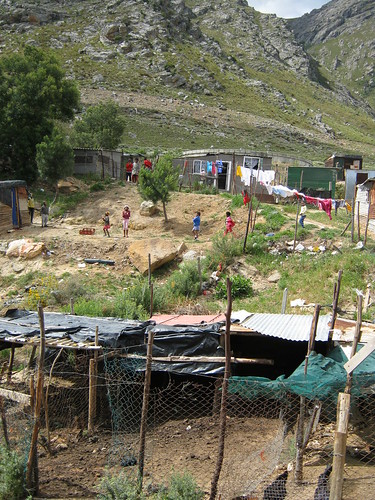By Barbara Torresi, CORC
La Rochelle is a small informal settlement consisting of 25 mixed material dwellings, some of them brick and mortar structures dating back to the end of the 19th century. The community was successfully enumerated in March 2011 and the first phase of the settlement upgrading process is now underway. There are 69 people living on the site, including two (husband and wife) who were chased out by the community because of unruly drunken behaviour and who are now sleeping under a makeshift tent a hundred meters from the settlement. There are four portable toilets but they are cleaned only once a week. The municipality does not provide a garbage collection service and the community burns its refuses on site, with the consequent danger of flames spreading to the shacks. With regard to water, there are no access points in La Rochelle and people have to use a tap located outside the camp proper. Moreover, none of the houses is connected to the grid and the high mast lights in the formal settlement are insufficient to create conditions of visibility in La Rochelle after dusk. Darkness is indeed a serious problem as it encourages criminal activity, and in particular the sale of drugs from two derelict houses at the back of the settlement. With gangsters crawling around undisturbed it is now so unsafe to be outside at night that people are living in fear: a woman was raped a few weeks ago and as winter approaches even something as unavoidable as returning home from work is becoming fraught with danger.
On 1st April 2011 a delegation of municipal officials, community leaders from the Backyarders and ISN, and Corc visited La Rochelle with the aim of discussing facilities upgrading. The following actions were agreed on:
- the municipality will demolish one of the two derelict houses used by local criminals as a logistic base. Since the other house does not lie on a municipal plot, the community will approach the owner of the land with a written request to demolish the structure.
- the municipality will appoint a service provider to clean the toilets twice a week.
- a contractor appointed by the municipality will relocate six shacks to a clearing at one end of the settlement. This is necessary to create space for bulk infrastructure placing, and in particular the construction of a road flanking La Rochelle.
- the municipality will extend the existing water pipe into the settlement to create two water access points. However, the layout of the shacks to be relocated must be finalised before deciding the locations of the new taps.
During the upgrading meeting the possibility of relocating a small informal settlement named Schoopieshoegte to La Rochelle was also discussed. This is a breakaway community of 16 households that left Mandela City – a medium-sized informal settlement at the other side of Klapmuts – a couple of years ago. However, since these settlers are currently squatting on provincial land the municipality is unable to provide them with even the most basic services. On the other hand, moving them to La Rochelle would create enough critical mass for cost-effective infrastructure upgrading in the latter.

